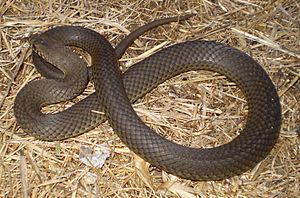Austrelaps facts for kids
Quick facts for kids Austrelaps |
|
|---|---|
 |
|
| Austrelaps labialis | |
| Scientific classification |
|
| Kingdom: | Animalia |
| Phylum: | Chordata |
| Class: | Reptilia |
| Order: | Squamata |
| Suborder: | Serpentes |
| Family: | Elapidae |
| Subfamily: | Hydrophiinae |
| Genus: | Austrelaps Worrell, 1963 |
Austrelaps is a genus (a group) of venomous snakes that live in the cooler, southern and eastern parts of Australia. These snakes are often called copperheads or Australian copperheads. However, they are not related to the American copperhead snake. There are currently three types, or species, of Australian copperheads.
Contents
About Australian Copperheads
There are three main types of Australian copperheads: the pygmy, the highland, and the lowland. Each type has a slightly different size and lives in different areas.
- The pygmy copperhead is about 60 cm (2.0 ft) long. You can find it in South Australia and on Kangaroo Island.
- The highland copperhead grows to about 1.25 m (4.1 ft) in length. It lives in northern Victoria and southern New South Wales.
- The lowland copperhead can reach up to 1.75 m (5 ft 9 in) long. It lives in southern Victoria and Tasmania.
Australian copperheads are usually medium-sized snakes. Most are between 1.4–1.7 m (4.6–5.6 ft) long. It's rare to see one longer than 1.8 m (5.9 ft). Their colors can vary a lot. They might be coppery brown, yellowish, reddish, grey, or even black. The "copper" color on their head, which gives them their name, isn't always there. Some snakes also have special markings right behind their head. Because they look so different, it took a long time for scientists to realize there were three separate species.
Common Names
People call these snakes by several names. The most common are copperhead and Australian copperhead. Other names include diamond snake, superb snake, lowland snake, and highland snake.
Where They Live and Their Homes
Copperheads are very good at living in cooler weather. They stay active even when most other reptiles are resting. They are also the first snakes to start hunting again when winter ends. They prefer to live near water. While you might not see them everywhere, they gather in large numbers where the conditions are just right for them.
How They Behave
Most of the year, copperheads are active during the day. This means they are diurnal. But when the weather gets very hot, they switch to hunting at night.
What They Eat
Copperheads are very comfortable in the water. They swim well and often hunt for tadpoles. They eat many different kinds of animals that are the right size for them. This includes their own young sometimes. However, their main food is frogs. Where there are lots of frogs, you will usually find many copperheads, and not many other types of snakes.
How They Have Babies
Copperheads start to breed in the spring. The female snakes give birth to live young in late summer. They usually have about 14 babies at a time. Each baby snake is a little less than 20 cm (7.9 in) long when it is born.
Their Venom
Like all elapid snakes (members of the family Elapidae), Australian copperheads have hollow fangs that are fixed at the front of their mouth. They are generally shy and prefer to get away rather than fight if they can. Their venom is considered moderately strong compared to other Australian snakes. However, they can deliver a good amount of venom. If a copperhead bite is not treated, it can be very dangerous for a healthy adult. There isn't a special antivenom just for copperheads, but the antivenom used for tiger snake bites works well.
Species of Australian Copperheads
| Species | Authority | Common name | Geographic range |
|---|---|---|---|
| A. labialis | (Jan, 1859) | pygmy copperhead | Australia (South Australia) |
| A. ramsayi | (Krefft, 1864) | highland copperhead | Australia (New South Wales, Victoria) |
| A. superbus | (Günther, 1858) | lowland copperhead | Australia (New South Wales, South Australia, Tasmania, Victoria) |
- Genus Austrelaps at The Reptile Database
- Integrated Taxonomic Information System - Austrelaps
See also
 In Spanish: Austrelaps para niños
In Spanish: Austrelaps para niños

